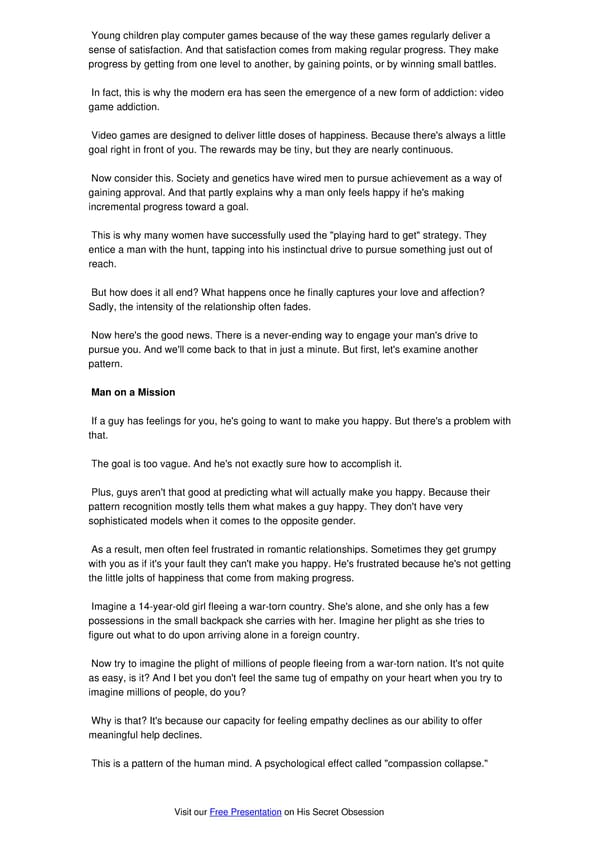Young children play computer games because of the way these games regularly deliver a sense of satisfaction. And that satisfaction comes from making regular progress. They make progress by getting from one level to another, by gaining points, or by winning small battles. In fact, this is why the modern era has seen the emergence of a new form of addiction: video game addiction. Video games are designed to deliver little doses of happiness. Because there's always a little goal right in front of you. The rewards may be tiny, but they are nearly continuous. Now consider this. Society and genetics have wired men to pursue achievement as a way of gaining approval. And that partly explains why a man only feels happy if he's making incremental progress toward a goal. This is why many women have successfully used the "playing hard to get" strategy. They entice a man with the hunt, tapping into his instinctual drive to pursue something just out of reach. But how does it all end? What happens once he finally captures your love and affection? Sadly, the intensity of the relationship often fades. Now here's the good news. There is a never-ending way to engage your man's drive to pursue you. And we'll come back to that in just a minute. But first, let's examine another pattern. Man on a Mission If a guy has feelings for you, he's going to want to make you happy. But there's a problem with that. The goal is too vague. And he's not exactly sure how to accomplish it. Plus, guys aren't that good at predicting what will actually make you happy. Because their pattern recognition mostly tells them what makes a guy happy. They don't have very sophisticated models when it comes to the opposite gender. As a result, men often feel frustrated in romantic relationships. Sometimes they get grumpy with you as if it's your fault they can't make you happy. He's frustrated because he's not getting the little jolts of happiness that come from making progress. Imagine a 14-year-old girl fleeing a war-torn country. She's alone, and she only has a few possessions in the small backpack she carries with her. Imagine her plight as she tries to figure out what to do upon arriving alone in a foreign country. Now try to imagine the plight of millions of people fleeing from a war-torn nation. It's not quite as easy, is it? And I bet you don't feel the same tug of empathy on your heart when you try to imagine millions of people, do you? Why is that? It's because our capacity for feeling empathy declines as our ability to offer meaningful help declines. This is a pattern of the human mind. A psychological effect called "compassion collapse." Visit our Free Presentation on His Secret Obsession
 doc Page 5 Page 7
doc Page 5 Page 7